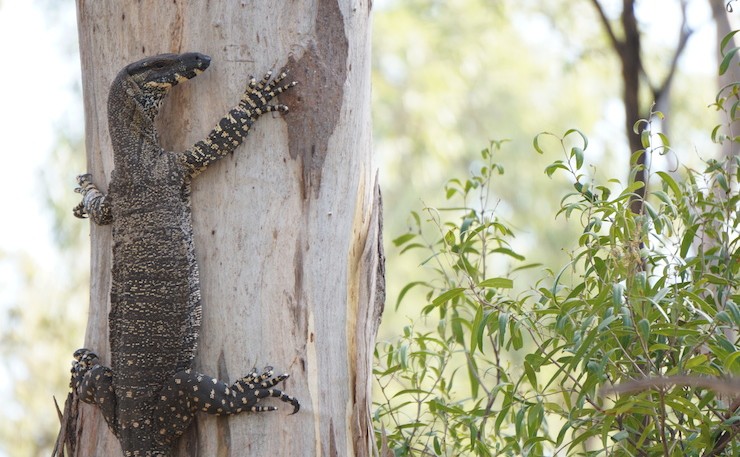After the Coalition infamously attempted to water down legal protections for the environment, Labor has now promised a new framework that could help depoliticise the field. Thom Mitchell reports.
The Federal Labor Party is promising to begin an overhaul of national environmental law within 100 days of taking office, and floating the idea of an “independent environmental protection structure”.
The policy suite, announced last night, has been enthusiastically welcomed by green groups, which have unanimously rejected the Coalition’s unsuccessful attempts to pass off most Federal powers to the states and territories.
Labor has also pledged to reinstate the funding of the Environmental Defenders Offices, a network of specialist public interest lawyers which faced the razor gang after Tony Abbott took office.
The development puts Labor and the Coalition on very different trajectories in regards to environmental policy as the July 2 election looms.
While the Coalition has attempted to restrict the ability of environmental groups to use the law to challenge government decisions, Labor’s proposal would at least retain, and more likely extend existing rights under environmental law.
The return of funding to the Environmental Defenders Offices would also have important implications, alleviating the pressure to scrounge for philanthropic support which has hampered the public interest lawyers since the Coalition withdrew all funding after 18 years of bipartisan support.
The Productivity Commission came out against the funding cuts in 2014, noting that the EDOs bring the vast majority of public interest, community-led environmental litigation. The Commission noted that the EDOs serve an important function in providing access to justice, something many in the sector would argue the Coalition has attempted to restrict since it took office in 2013.

Last year the Attorney-General George Brandis led an extraordinary attack against so-called green “lawfare” – which the government argued was merely a foil for stopping development – after environmental groups successfully challenged decisions made by Environment Minister Greg Hunt.
As a response, the Coalition tried to amend the omnibus Environmental Protection and Biodiversity Conservation Act so that environmental groups and individuals would not be able to challenge government decisions in the future.
The Coalition has also attempted to curtail the ability of environmental groups to engage in advocacy work, launching a Senate Inquiry which attacked their tax-deductible status.
The offensive came despite warnings from environmental law experts that current protections are not enough, as the extinction rate continues to accelerate and the state of the environment is degraded.
The Director of the Places You Love Alliance – which brings together more than 40 green groups – Glen Klatovsky said the current law “was a good start nearly 20 years ago, but it ignores such major threats as climate change and fracking”.
He said “our current environment laws are not working well enough”.
“More than 1,200 Australian plants and nearly 400 animals are listed as threatened with extinction; More than half of the Great Barrier Reef’s coral has been lost in the past 30 years, and it’s suffering its worst bleaching event,” he said.
“More than 3,000 Australians die every year from air pollution-related illness, nearly twice the national road toll; one million hectares of Australian bushland was destroyed in the first decade of this century; and 50,000 mines need to be remediated.”
Despite the pressing weight of this environmental degradation, the Coalition had tried to pass off environmental assessment and approval powers to the states and territories, in a messy process that ultimately stalled in the Senate.
The Environmental Defenders Offices reviewed the proposal, and found that it would wind conservation protections back to where they were three decades ago.
The National Director of the Wilderness Society, Lyndon Schneiders said “the Coalition’s failed attempt at environmental law reform was a disaster”. “[They were] trying to wrangle a jumble of eight different sets of state and territory laws and regulations into some sort of disjointed national framework,” he said.
As well as a review and eventual reform of current environmental laws, Labor has promised to explore options for an “independent environmental protection structure”.
The Greens have used this election campaign to propose a national environmental protection agency, a policy position embraced by environmental groups which hope Labor would mirror it if they emerge victorious from this year’s July 2 poll.
In its policy document, Labor acknowledges that public faith in the current system of environmental assessment and approvals is waning.
“There is a growing public demand for greater transparency and independence in decision making following on from accusations and confirmed instances of coercion and corruption around project approvals at a political level,” Labor’s policy document said.

Klatovsky backed the proposal for a Federal environmental protection agency.
“It could coordinate all environmental assessments with independent assessors; give transparent advice to the Environment Minister; look after monitoring, compliance and enforcement; and become a central repository of environmental data,” he said.
Adjunct Professor Rob Fowler is convening a Panel of 16 Experts on Environmental Law – including former judges, professors, senior academics, practicing lawyers, and international experts – which is connected to but independent of the Places You Love Alliance.
“I think [the panel is]coming to a conclusion that an authority that is more independent in character is needed, to depoliticise the key environmental decisions,” Prof Fowler said.
He agrees that part of the problem with the current law is that it’s extremely rare for a development to actually be rejected.
“I think there’s a range of reasons for that: One reason of course is that under the EPBC Act the final decision is made at a political level by the Minister, and also the criteria that are to be applied in making decisions don’t encourage a ‘no’ decision,” he said.
“The idea of applying the precautionary principle still hasn’t really had full operation, it hasn’t been given full affect; and even the concept of ecologically sustainable development has a very open-ended sort of frame of reference to it which allows for economic considerations to often outweigh environmental considerations.”
The Panel of Experts on Environmental Law will release a series of discussion papers after the election, but Prof Fowler said they will “certainly include some of the things that have been raised in the ALP policy”.
The detail of the Labor Party’s policy will remain unknown until after the election, but it is clear that the Opposition’s announcement has tapped into a mood for change among advocates and experts.
Donate To New Matilda
New Matilda is a small, independent media outlet. We survive through reader contributions, and never losing a lawsuit. If you got something from this article, giving something back helps us to continue speaking truth to power. Every little bit counts.






